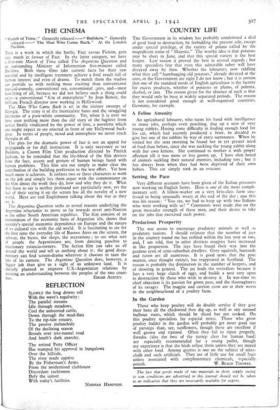THE CINEMA
March of Time." Generally released.--" Builders." Generally released.—" The Man Who Came Back." At the London Pavilion.
THIS is a week in which the battle, Fact versus Fiction, goes very much in favour of Fact. In the latter category, we have a first-rate March of Time called The Argentine Question and an outstanding Ministry of Information five-minuter called Builders. Both these films take current facts for their raw material and by intelligent treatment achieve a final result full of human interest and even of drama. To match them the studios can provide us with nothing more exciting than conventional musical-comedy, conventional sex, conventional :Ties, and—most horrifying of all, because we did not believe such a thing could exist—a conventional " Wm of atmosphere" by Jean Renoir, the brilliant French director now working in Hollywood.
The Man Who Came Back is set in the sinister swamps of Georgia. The story is of the inarticulate hates and the struggling decencies of a poor-white community. Yet, when it is over we have seen nothing more than the old story of the fugitive from justice finally vindicated by the power of love, a novelette which one might expect to see enacted in front of any Hollywood back- drop. In terms of people, mood and atmosphere we never reach Georgia at all.
The plea for the dramatic power of fact is not an appeal for propaganda or for dull instruction. It is only necessary to see Builders, a Crown Film Unit production directed by Patrick Jackson, to be reminded that the life-blood of the film derives from the face, accent and gesture of human beings faced with human problems. This film sets out simply to make clear the contribution of the building profession to the war effort. Yet ho* much more it achieves. It isolates two or three characters at work on the job and simply lets them argue with the commentator on the film about the work they do, how and why they do it. What they have to say is neither profound nor particularly new, yet the fact of their saying it on the screen has all the novelty Of a new world. Here are real Englishmen talking about the war as they see it.
The Argentine Question seeks to reveal reasons underlying the Argentine reluctance to move so far towards overt anti-Nazism as the other South American republics. The film consists of an examination of the economic basis of Argentine life, shows that country's special economic dependence on Europe and the nature of its cultural ties with the old world. It is fascinating to see for the first time the everyday life of Buenos Aires on the screen, the subway, the buses, the shops, the recreations ; to see what sort of people the Argentinians are, from dancing gauchos to reactionary estancia-owners. The fiction film can take us all around the world and tell us nothing about it : the good docu- mentary can find screen-drama- wherever it Chooses to turn the lens of its camera. The Argentine Question does, however, a bigger job than give us a sight of an unknown land. It is cleverly planned to improve U.S.-Argentinian relations by assisting an understanding between the peoples of the two coun-


























 Previous page
Previous page